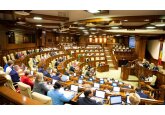
Moldova needs to find a balance between short-term objectives of mitigating the immediate effects of the overlapping crises and supporting long-term and sustainable inclusive growth – the WB.
This is stated in a new World Bank study, "Public Finance Review. Fiscal Policy Focused on Sustainability and Economic Growth," which was presented Tuesday at the Economic Press Club. WB experts say Moldova's public finances over the past 20 years have been characterized by some common features: pro-cyclical and inefficient spending, and revenue collection with an emphasis on indirect taxation. Moldova's structural characteristics typical of a small economy, including a backward production base, overdependence on imports, and vulnerability to external shocks, especially natural disasters, require smart tax reforms. The WB experts believe that in the current economic environment and with growing uncertainty, the authorities will have to strike a balance between short-term goals of mitigating the immediate effects of several overlapping crises and supporting inclusive long-term inclusive growth in a fiscally sustainable way. At the same time, it is important to maintain some fiscal flexibility ahead of the winter season and to have contingency plans in case food and energy prices rise further. Close coordination of fiscal and monetary policy is necessary to support economic growth and ensure a disinflationary trend. The study argues that improved spending efficiency and redistributive efforts are critical to maintaining household purchasing power in the short term, as well as creating the space needed to support long-term growth and ensure fiscal sustainability over the medium term. Revenue mobilization efforts must be supported by a more progressive and less distortive tax system. In addition, it is important to strengthen the structure of fiscal relations between central and local authorities, state agencies, and state-owned enterprises to minimize unforeseen risks. // 13.06.2023 – InfoMarket







